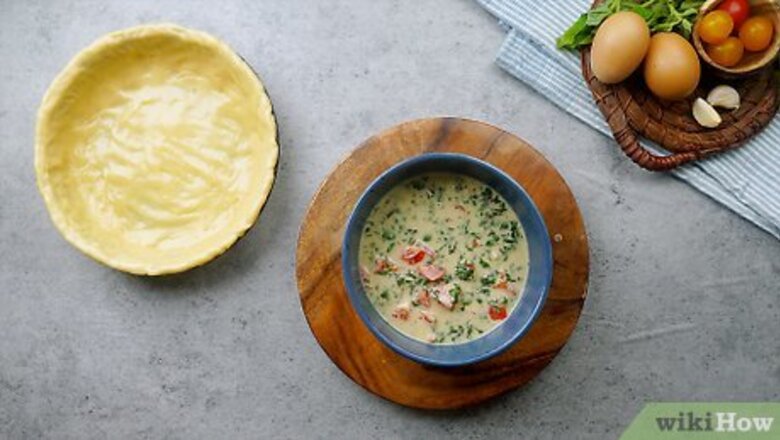
views
Unbaked and Pre-Assembled Quiche
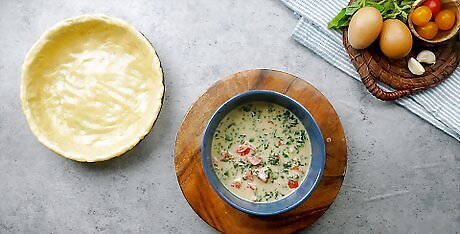
Keep the filling separate from the crust. You can freeze unbaked quiche filling separately from the crust or you can freeze the entire unbaked quiche together, but if you want to maintain a crisper, flakier crust, it is strongly recommended that you freeze the filling separately. You may also want to consider making the filling before the crust if you intend to keep it for long-term storage. The filling can last for several months in the freezer, but the quality of the crust will deteriorate after a few days.
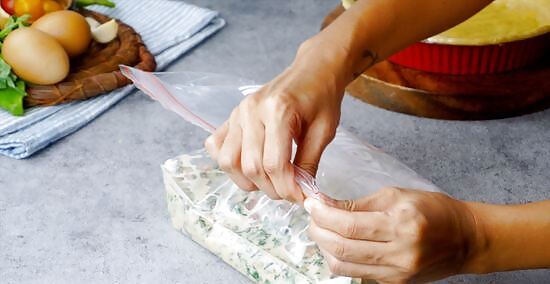
Place the filling in a freezer bag. Prepare the quiche filling as directed in the recipe's instructions. Pour the filling into a large plastic freezer bag and seal the bag, getting out as much excess air as possible beforehand. Only use a freezer-safe bag or container. Do not use a glass container, and do not use a thin plastic bag that is too flimsy to hold up in the freezer. Label the bag or container with the current date and the contents of the bag. This will make it easier to remember how long the filling has been in the freezer.
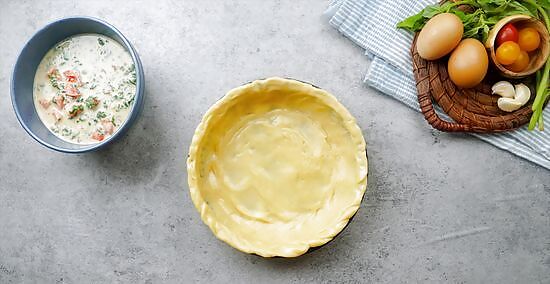
Roll the pastry out into a pie tin. As a general rule, it is better to prepare the crust shortly before baking it rather than making it ahead of time and trying to freeze it, but if you do decide to make the crust ahead of time, you should roll it out into its intended pie dish and place both the dish and crust into a large plastic freezer bag. Label the bag with the current date. Doing so will make it easier to keep track of how long the crust has been in the freezer.
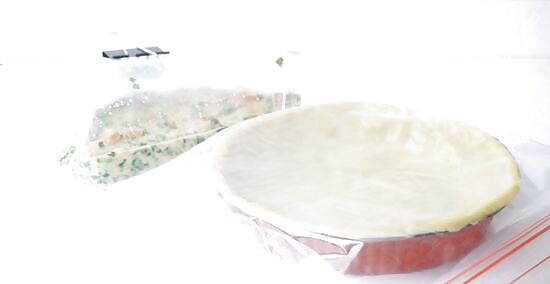
Freeze until ready to use. Place both the crust and the filling in the freezer, keeping them at a temperature of 0 degrees Fahrenheit (-18 degrees Celsius) until you intend to assemble and bake the dish. An unbaked quiche filling can be frozen for up to one to three months, but the unbaked crust should not be frozen for much longer than 24 or 48 hours.
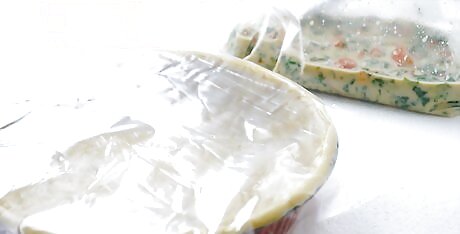
Thaw the filling and crust when ready to use. Place the bag of filling and the crust in the refrigerator. Let them thaw in there slowly, until the filling warms up enough to turn back into a liquid. The filling will need to thaw for a longer period of time than the pie crust. The crust only needs to be thawed for about 15 minutes. The filling will need to defrost in the refrigerator for one or two hours. Plan ahead of time, and make sure that the filling has ample time to thaw back into a liquid state before you need to bake it.
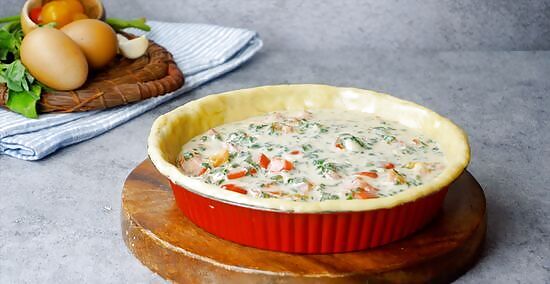
Assemble and bake as directed. Pour the filling into the crust and bake the quiche as directed in the recipe's instructions. Since both parts should be thawed by this point, the cooking time should not be affected. Note, however, that if the quiche filling still contains ice crystals, you may need to bake it for an additional five minutes or so since the filling will need to warm up in addition to baking.
Unbaked but Assembled Quiche
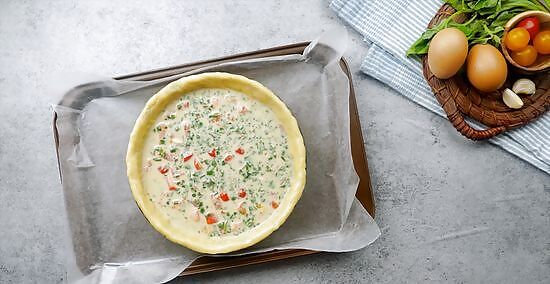
Place the assembled quiche on a baking sheet. If you decide to freeze an unbaked quiche after pouring the filling into the crust, do so by tray freezing it. Line a baking sheet with parchment paper and set the quiche on top. The parchment paper is not strictly necessary, but lining the baking sheet with parchment paper first can make it easier to clean things up in case any of the filling spills out and onto the tray as you transfer it into the freezer.
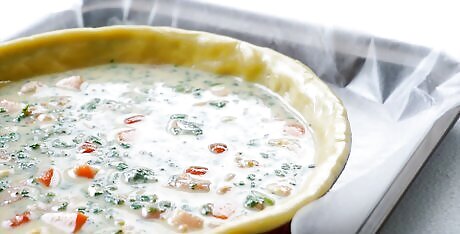
Freeze until firm. Transfer the quiche and the baking sheet into the freezer, letting it rest in as flat a position as possible. Freeze the quiche for several hours, or until the filling becomes solid. The quiche should be as solid as possible. If the surface is soft, sticky, or tacky, it might stick to the plastic wrap or become indented after you place it in the freezer for storage.
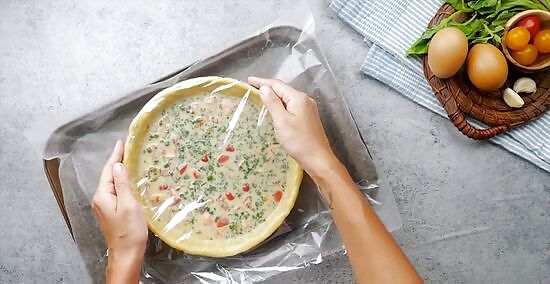
Cover the quiche with plastic wrap. Get a large piece of plastic wrap and wrap it around the entire quiche, pressing the edges of the wrap together to create an airtight seal. It is important that you place the plastic wrap over the quiche before you place the aluminum foil over it. The plastic wrap will prevent the foil from sticking to the quiche after it freezes.
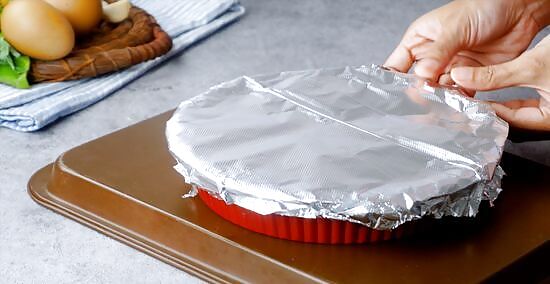
Wrap a layer of aluminum foil over the dish. Cover the plastic wrap covered quiche with a layer of aluminum foil. Once again, you should seal the edges firmly to minimize the amount of air getting inside. It is important that you do not let air come into contact with the quiche as it freezes. If the quiche gets exposed to air, ice crystals could form on the surface. These ice crystals could cause the crust to become soggy once they melt.
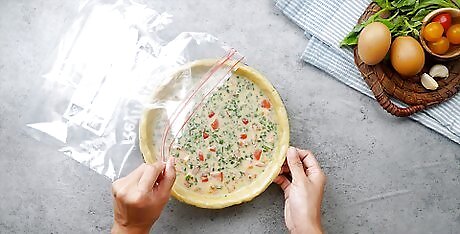
Consider placing the quiche into a large plastic freezer bag. If you do not have plastic wrap and/or aluminum foil, or if you are not confident that you created tight seals with either, place the quiche into a large plastic freezer bag and seal, squeezing out the excess air before zipping it closed. Whether you do this step or not, you should label the outer layer of wrapping with the current date and the contents of the dish. Doing so will make it easier for you to keep track of how long the quiche has been in the freezer.
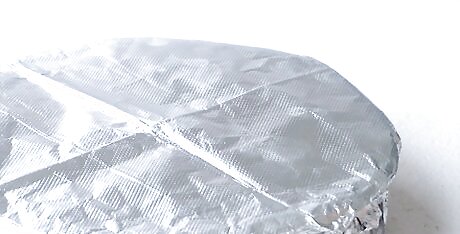
Freeze until ready to use. Transfer the wrapped quiche to the freezer and let it remain there at a temperature of 0 degrees Fahrenheit (-18 degrees Celsius) until you are ready to use it. Unbaked quiche can be frozen for about one month without the quality being reduced.

Bake from frozen when ready. Do not thaw the quiche prior to baking it. Unwrap it and bake as directed according to the recipe's instructions, allowing 10 to 20 minutes of extra baking time. Baking the quiche from frozen is recommended since thawing it out first can increase the likelihood of the crust becoming soggy.
Baked Quiche

Tray freeze the baked quiche. Bake the quiche as directed, but place it on a baking sheet before doing so. When you finish baking it, transfer the tray to the freezer, and let the quiche freeze until the soft center is frozen as hard as ice. Even though the quiche is technically solid after it bakes, the filling is still quite soft. Letting it tray freeze before going into long-term freezer storage can prevent the soft filling from getting damaged in the freezer.
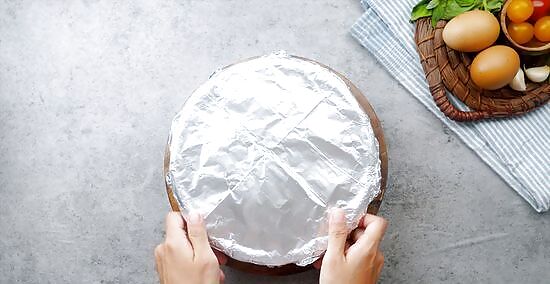
Wrap the quiche in two protective layers. Use a layer of plastic wrap and a layer of aluminum foil to wrap up the pre-frozen quiche, making sure that all the edges are thoroughly sealed to prevent excess exposure to the air. If necessary, you can also place the quiche in a large plastic freezer bag for an even more airtight seal. Label the quiche with the current date and the contents of the dish. This will allow you to keep track of how long the quiche has been in the freezer.
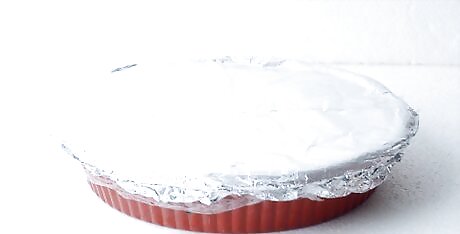
Freeze until ready to use. Keep the quiche in its pie dish and place it in the freezer, keeping it at a temperature of 0 degrees Fahrenheit (-18 degrees Celsius) until you are ready to serve it. Baked quiche can be frozen for two to three months, if necessary, without the quality being negatively affected.

Bake from frozen until heated through. Do not thaw the quiche before you warm it up. Pull it out of the freezer and transfer it to an oven preheated to 350 degrees Fahrenheit (180 degrees Celsius). Let it bake for 20 to 25 minutes, or until it has completely warmed through. It is recommended that you do not thaw the quiche before warming it. Thawing it first can make the crust get moist and soggy.


















Comments
0 comment